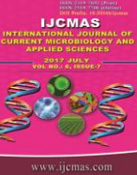


 National Academy of Agricultural Sciences (NAAS)
National Academy of Agricultural Sciences (NAAS)

|
PRINT ISSN : 2319-7692
Online ISSN : 2319-7706 Issues : 12 per year Publisher : Excellent Publishers Email : editorijcmas@gmail.com / submit@ijcmas.com Editor-in-chief: Dr.M.Prakash Index Copernicus ICV 2018: 95.39 NAAS RATING 2020: 5.38 |
Women focused approach was advocated as a part of the strategy under which sufficient number of women dairy cooperative (WDC) societies was formed at village level with the point of view that WDC would provide a source of additional income and an organized platform to seek redress of personal, social and other grievances of women to empower them. To assess the women empowerment level through WDCs, the present study was conducted in Karnataka by selecting three districts by proportionate random sampling method. A total of 6 WDCs and 240 members of WDCs constituted the sample of study. Most of the respondents had medium level of social empowerment, cultural empowerment, psychological empowerment, economic empowerment, technological empowerment, while, most of them had low level of legal and political empowerment. Empowerment under psychological component was the strongest while under political it was found to be the weakest. Herd size, milk production, milk sale, income from dairying, social participation, training received and information seeking behaviour were found to be positively and highly significantly correlated with dairy women empowerment. It could be inferred from the regression model that social participation, training received and information seeking behaviour were playing a major role in empowering the women. The role played by WDC is much appreciated which can also be replicated in other parts of the country.
 |
 |
 |
 |
 |